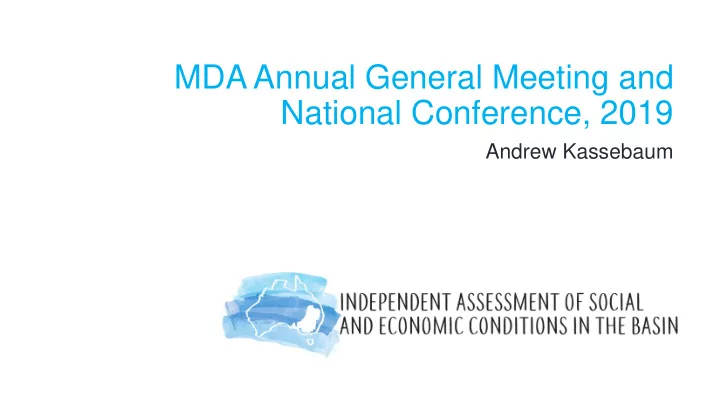

MDA Annual General Meeting and National Conference, 2019 Andrew Kassebaum
Contents • Project overview and Terms of Reference • Statement from the Chair • Pathway to impact and timeline • Update on consultation
Project overview Panel established to review social and economic conditions in the Murray- Darling Basin, the relationship with water and water reform, and potential opportunities and solutions to improve social and economic conditions Panel: • Robbie Sefton (chair) • Andrew Kassebaum • David McKenzie • Deborah Peterson • Michelle Ramsay • Bruce Simpson • Rene Woods
Terms of reference A. The review will provide an independent assessment of social and economic conditions in rural and regional communities across the Murray-Darling Basin. B. The review will assess impacts (positive and negative) of water reforms including the Basin Plan on the vulnerability, resilience and adaptive capacity of Murray-Darling Basin communities and their development potential. This will include consideration of social and economic impacts of the environmental effects of water reforms. C. The review will consider ongoing structural changes influencing different communities in the Murray-Darling Basin, and seek to separate the effects of these trends, and events such as drought, from the effects of water reform, including the Basin Plan. D. The review will support longer-term efforts to monitor and understand social and economic conditions in the Basin, and the impact (positive and negative) of water reform on different communities in the Murray-Darling Basin. This will be used by governments and leaders to help understand the outcomes of water reform, including the Basin Plan. However, this is not a review of the Basin Plan. E. The work of the Panel will explore a range of options that stimulate, support and promote healthy and sustainable rural and regional communities in the Basin.
Statement from Chair • Our aims and objectives • Our values • Our principles
Pathway to impact Revie iew of of existin ing literature Imp mpact fr from om ou outp tputs Ter erms of of Reference plus plus ne new rese esearch and and an analysis Impact to drive outcomes: Terms of reference Synthesis of technical work, and input provided for public from Basin communities informs: • improved understanding of conditions, comment and refined • Interim and Final Reports drivers, trends and objectives • based on submissions and Recommendations and findings • better monitoring and review of these input from stakeholders. conditions over time Agreed by the Panel and • influencing improved decision-making in endorsed by the Minister response in September 2019. Engagement wi Eng with com ommunit itie ies to o Imp mpacts fr from om pr proc ocess und understand lived experie ience and and con ondit itio ions Ter erms of of Reference ac acros oss the the Basi Basin
Timeline and process Nov. – Dec. August September - October Jan - March April Fi First rou ound of of stakehol older Foll ollow-up engagement eng engagement eng Interim im Rep epor ort Fi Fina nal Repo eport (Apr (April il Ter erms of of Reference (D (December 2019) 2020) 2020) Revie iew of of existin ing literature Furt Further rese esearch and and pl plus us ne new rese search and nd analy lysi sis s ana analy lysis Now
Stakeholder engagement The Panel has recently completed consultation across the following locations: Northern region Western region Southern region Goondiwindi Mildura Griffith Dirranbandi Menindee Coleambally Mungindi Wentworth Deniliquin Moree Barmera Hay Wee Waa Loxton Balranald Walgett Murray Bridge Swan Hill Bourke Strathalbyn Wakool Warren Finley Quambone Shepparton Cobram Cohuna
What we are asking stakeholders 1 How would you describe the current health and prosperity of your community? 2 What are the major strengths and opportunities, or challenges in your community or region? Looking back, what have been the major trends and drivers impacting your community, and how 3 do you view these looking forward? Do you believe water management and reform has changed your community? If so, can you 4 describe how? 5 What do you see as the main inhibitors or facilitators of positive change and why? 6 What does a sustainable and prosperous community look like to you? What roles can governments, industry, non-profit groups, First Nations, communities and 7 individuals play in supporting prosperous and sustainable Basin communities?
What we are hearing so far • Many communities are doing it tough, while others are thriving – there are very different stories depending on where you are in the Basin. • Some communities are really struggling and consider themselves ‘in crisis’. In these communities there is a lack of hope and vision that is concerning • Water reform, particularly the Basin Plan, is often viewed as the main driver of change – and many believe current water shortages are man-made rather than drought. • There is a common theme of misunderstanding and misinformation across water availability and allocation, water reform and water management • Many communities have noted they would like to see more vision and leadership from government for regional Australia, and irrigated agriculture.
Next steps The Panel will be concluding stakeholder engagement and our online survey at the end of this week We will then be focused on delivering an interim report by December Online survey can be found on our website: https://www.basin- socio-economic.com.au/
Recommend
More recommend